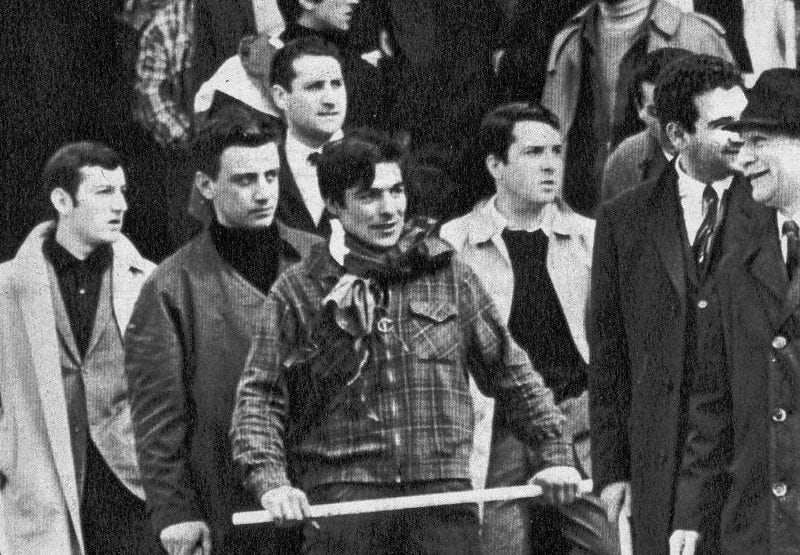Here is the second part of my translation of Adriano Romualdis's essay, The European Right and the Nationalist Crisis.
To read Part 1, click here:
Now for part II:
________________________
Whoever is capable of recognizing this reality— the aforementioned inevitability of the modern world’s reorganization across vast spaces— also understands that the sun already began to set on pure nationalism in 1939, when the laws of history demanded a choice. The world was forced to choose between the continental systems, either the system of Germany, Russia, or the Anglo-Saxons. As Europeans, as anticommunists, and as fascists, we are the torchbearers of this luminous idea of European renewal that Germany had kindled, and we Italians could only stand by the side of German National Socialism. The belief that one could remain neutral in a clash that decided the type of hegemony— and therefore the flavor of any future civilization— that would be established in Europe betrays a petty mind and limited historical imagination.
Even though our vital interests lay in the Mediterranean— and therefore diametrically opposed to the Anglo and the French— and even though Italy was in the center of the Mediterranean, we could not afford to remain neutral in a war involving England, who was at the time the very sovereign of this Mediterranean. No rational man could seriously claim that Mussolini could have stayed out of an ideological-continental war that hinged upon the very name of Fascism.
The example of Franco or Salazar demonstrates nothing. It is not historically serious to compare Mussolini, the custodian of European political culture in the first half of the 20th century, with Franco or Salazar. Nor is it serious to compare Fascist Italy, the vessel of revolutionary nationalism that enraptured the youth of Europe, with the paternal Catholicism of a Franco or of a Salazar, whose aim is to send young people to bed early and prevent them from engaging in politics.
We do not wish for this judgment to seem hypocritical: it is undeniable that a certain order was conserved in Spain and Portugal, where communists still risk prison sentences, and this is certainly positive. But it is not enough to fill the gaping spiritual void of those nations, the emptiness that Americanism and the culture of the left have filled as they have filled elsewhere. For in a revolutionary age such as ours, where the borders between nations are not airtight, a patriotic movement that merely conserves and defends can not hope to hold in the ideological storm that sweeps the continents.
He who understands these facts, also understands that by 1940 traditional nationalism found itself at a historical crossroads, either wither and grow old in a corner or participate with Germany in the continental nationalist revolution and the grand reordering of Europe. The fact that Mussolini, despite the laborious contradictions of a waning Nationalism- never doubted the necessity of entering the war, is a true testament to his political sensibilities and historical intuition.
However, one could not go so far as to claim that the regime entered the war wholly prepared. And yet, this lack of preparation has nothing to do with military stockpiles or training. Whoever has seriously studied the problem of our military intervention knows that our martial force was sufficient in 1940 to crush the weak English presence in Africa and the Mediterranean. What was missing was something far more important. We lacked a revolutionary political mindset, a mentality adapted to a continental war, imperial, ideological.
We entered into a war that decided the conquests of great territories in Africa and the Mediterranean, but with a small-minded and outdated nationalist mentality that expressed itself in the petty slogans of Corsica-Nizza-Savoia. We entered into a war that determined the spiritual form of the continent, and our managerial class failed to grasp the historical and geopolitical significance of that titanic struggle of Germany for the reordering of Europe. We entered into an ideological and continental war with a rucksack of provincial patriotism whose horizons were limited to the towns of Piave and Grappa, and not the Suez Canal nor the oil fields of the Iraqis.
This was the root of all of our uncertainties over the conduct of the war, and of the crises of the Regime that emerged dramatically on the 25th of July. To explain the failure of the fascist managerial class during the war, an old excuse is dredged up— that the bourgeoisie had defected. As if Fascism did not survive to the very end, in the RSI, which was essentially based on bourgeois forces. This explanation is painfully simplistic and economistic and does not find a basis in reality.




